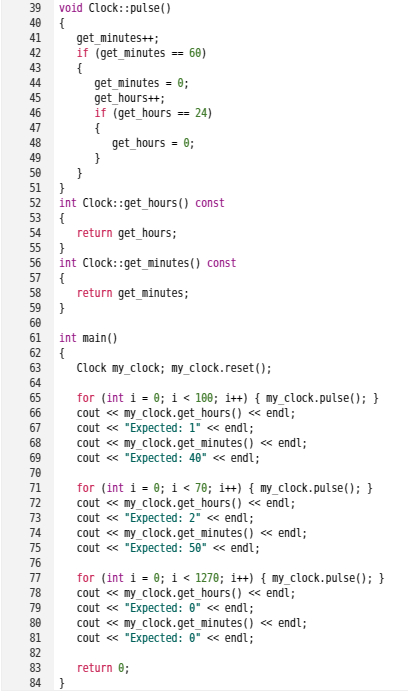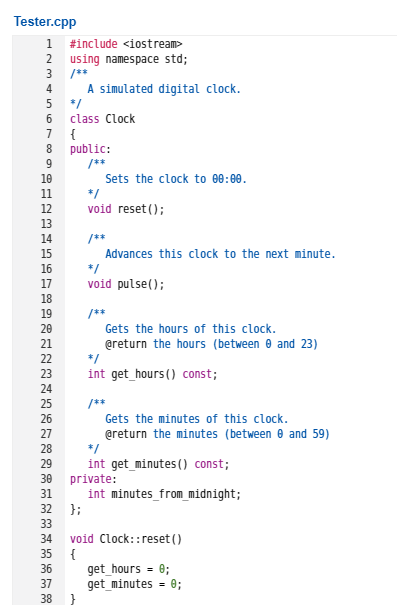Reimplement the digital clock from the preceding exercise, representing the time as the minutes from midnight. This makes the pulse member function very easy, but you have to work harder to recover the hours and minutes. For example, 100 minutes after midnight is 1 hour and 40 minutes. C++
Reimplement the digital clock from the preceding exercise, representing the time as the minutes from midnight. This makes the pulse member function very easy, but you have to work harder to recover the hours and minutes. For example, 100 minutes after midnight is 1 hour and 40 minutes. C++
C++ Programming: From Problem Analysis to Program Design
8th Edition
ISBN:9781337102087
Author:D. S. Malik
Publisher:D. S. Malik
Chapter10: Classes And Data Abstraction
Section: Chapter Questions
Problem 10PE
Related questions
Question
Reimplement the digital clock from the preceding exercise, representing the time as the minutes from midnight. This makes the pulse member function very easy, but you have to work harder to recover the hours and minutes. For example, 100 minutes after midnight is 1 hour and 40 minutes.
C++

Transcribed Image Text:void Clock::pulse()
{
get_minutes++;
if (get_minutes == 60)
{
get_minutes = 0;
get_hours++;
if (get_hours == 24)
{
get _hours = 0;
}
}
39
40
41
42
43
44
45
46
47
48
49
50
51
int Clock: :get_hours() const
{
return get_hours;
}
int Clock: :get_minutes() const
52
53
54
55
56
57
{
return get_minutes;
}
58
59
60
61
int main()
62
{
Clock my_clock; my_clock.reset();
63
64
for (int i = 0; i < 100; i++) { my_clock.pulse(); }
cout « my_clock.get_hours() « endl;
cout « "Expected: 1" « endl;
cout « my_clock.get_minutes() « endl;
cout « "Expected: 40" « endl;
65
66
67
68
69
70
for (int i = 0; i < 78; i++) { my_clock.pulse(); }
cout « my_clock.get_hours() « endl;
cout « "Expected: 2" « endl;
cout « my_clock.get_minutes() « endl;
cout « "Expected: 50" « endl;
71
72
<<
73
74
75
76
for (int i = 0; i < 1270; i++) { my_clock.pulse(); }
cout « my_clock.get_hours () « endl;
cout « "Expected: 0" « endl;
cout « my_clock.get_minutes() « endl;
cout « "Expected: 0" « endl;
77
78
79
80
81
82
83
return e;
84 }

Transcribed Image Text:Tester.cpp
1
#include <iostream>
2 using namespace std;
3 /**
A simulated digital clock.
*/
4
6.
class Clock
7
{
public:
/**
10
Sets the clock to 00:00.
11
*/
12
void reset ();
13
14
/**
15
Advances this clock to the next minute.
16
*/
17
void pulse();
18
19
/**
Gets the hours of this clock.
ereturn the hours (between e and 23)
*/
int get hours() const;
20
21
22
23
24
25
/**
26
Gets the minutes of this clock.
27
@return the minutes (between e and 59)
28
29
int get_minutes() const;
private:
int minutes_from midnight;
30
31
32 };
33
void Clock::reset ()
{
get_hours - 0;
get_minutes = 0;
34
35
36
37
38
Expert Solution
This question has been solved!
Explore an expertly crafted, step-by-step solution for a thorough understanding of key concepts.
This is a popular solution!
Trending now
This is a popular solution!
Step by step
Solved in 2 steps with 2 images

Knowledge Booster
Learn more about
Need a deep-dive on the concept behind this application? Look no further. Learn more about this topic, computer-science and related others by exploring similar questions and additional content below.Recommended textbooks for you

C++ Programming: From Problem Analysis to Program…
Computer Science
ISBN:
9781337102087
Author:
D. S. Malik
Publisher:
Cengage Learning

C++ Programming: From Problem Analysis to Program…
Computer Science
ISBN:
9781337102087
Author:
D. S. Malik
Publisher:
Cengage Learning